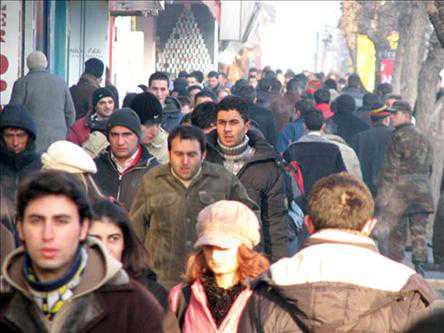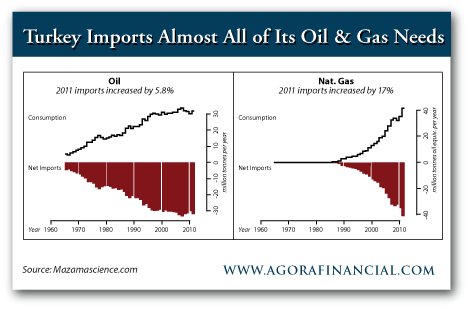By Chris Deliso
While Istanbul has always been one of the world’s unquestionably great cities, it has never made it onto the list of prime destinations for beer lovers.
Helping to change this sorry situation has been English couple Philip and Jill Hall, who together with Turkish partner Sedat Zincırkiran established the Bosphorus Brewing Company last November. Since then this spiffy new pub, which produces its own beers and serves home-cooked meals to a mixed Turkish and international clientele, has become a roaring success.
Despite being situated in a business district far from the touristy heart of the old city, the brewpub has developed a faithful following in only four months of operation, which seems to be increasing by the week.
According to the BBC’s Philip Hall, “as the locals are starting to develop a taste for craft beers, we are seeing around eighty percent Turks, and twenty percent foreigners!” (Photo courtesy Bosphorus Brewing Company)
A Pub for ‘Community-building’
We caught up with the Halls on a recent standing-room-only Friday night at the pub, where they explained the concepts behind its creation, amidst the revelry of many happy drinkers. Philip had been working as general manager of a chemicals company in Istanbul for several years when he got the idea to try something new.
After renovations which involved “completely ripping out” the premise’s former inhabitant, a restaurant, the brewpub opened its doors on 14th of November 2012, says Jill. As she is proud to point out, “this was the same date that the BBC began broadcasting in 1922.”
Of course, a love of good beer and a desire to enjoy flavors beyond the limited offerings from ensconced giants Efes and Tuborg was a major factor. But there was another reason for making this considerable new investment.
“I wanted the brewpub to become a community-building initiative, a call for creativity,” says Philip, implying the effect that similar international-flavored ventures have had in other countries. Indeed, with its large expat community, Istanbul would seem a perfect place to open a brewpub.
“At first, we thought that we would be basically targeting foreigners living in Istanbul,” says Philip, “and in the beginning the ratio of foreigners to Turks was indeed about fifty-fifty. But now, as the locals are starting to develop a taste for craft beers, we are seeing around eighty percent Turks, and twenty percent foreigners!”
Catering to Complex Tastes: the BBC’s Offerings
This development of tastes is a notable challenge for anyone wishing to break into the beer market in sultry Mediterranean and Balkan countries, where the warmer climes dictate a preference for lighter beers (note Greece’s ‘holy trinity’ of Amstel, Heineken and Mythos).
This has meant that the BBC’s flagship brews tend to be on the light side; they include the Istanbul Pale Ale, a typical IPA, Haliç Gold, similar to a Belgian ale, and Içmedik, a fresh and crisp lagered ale. Yet there is also the full-bodied Karbon Stout, the B4 Bitter, and recent favorite Yabangee, a rich and hoppy brew with the characteristics of those traditionally produced in Burton Upon Trent in England. It is thus kind of cultural sophistication and diversity that the Halls wished to contribute to Turkey today.
“We want to be creative but it is a bit difficult, since Turkish tastes are relatively conservative,” notes Philip. Nevertheless, the resident brewmeister keeps perpetually active, tinkering with new formulas, ingredients and recipes to increase the BBC’s range. Incredibly, everything is produced on the premises, which are more on the side of adequate than enormous.
Istanbul’s new microbrew option specializes in light beers and friendly local service (Photo courtesy Bosphorus Brewing Company)
The BBC’s goal is to have a rotation of new beers, in addition to their regular brews, available for two-week periods.
“We take on board customer suggestions,” says Jill, “and thus we can see which are most popular.” This helps them to see which beers are likely to be worthy of permanent production.
In some cases, just a bit of technical tinkering seems to have been adequate for adjusting to local tastes. For example, says former chemical engineer Philip, “with the IPA, all it took was just to reduce the temperature and carbonation levels.”
He is quick to add that “we didn’t want to compete with Efes- we had a different concept.” Nevertheless, it seems that the BBC’s sudden success has not gone unnoticed by both Turkey’s powerful brewing interests, and its conservative opponents of alcohol in general, which opens a fascinating window into local culture today.
Challenges and Restrictions
Although it is impossible to say whether the success of Istanbul’s modest brewpub had anything to do with it, the government on January 14, 2013 changed a law affecting any bar that self-produces on the premises. The government thus stopped giving brewing licenses under the guise of “protecting the health” of citizens. This reasoning has been stated for many similar anti-alcohol government decisions since 2003, when the Islamist AK Party took over.
Many suspect, however, that there are other reasons for these restrictions. Turkish journalists, such as Kadri Gürsel recently have discussed restrictions on alcohol in public spaces that have been gradually implemented by the government since 2003. Many Turks believe that the laws are actually meant to stigmatize and gradually eliminate all consumption of alcohol in the country on religious grounds. It is unlikely that the millions of secular-minded Turks will ever let this happen- to do so would be catastrophic for Turkey’s appeal as an international destination to most tourists. (And for Christ’s sake, even the Arabs come to Turkey to drink in peace).
However, in an ironic twist that shows the convergence of high-level interests, anti-alcohol government regulators and the big alcohol producers also see common cause in keeping down local production. Along with the BBC, there are only a couple other local beer producers in the entire country, including the now franchisedTAPS, open since 2002. Local production is a direct threat to the lucrative import tax that the government rakes in on imported alcohol, and for Turks to develop a taste for locally-produced beers in large numbers would damage this revenue stream.
Happy patrons on a typical night at the BBC. (Photo courtesy Bosphorus Brewing Company)
At the same time, big brewers like Efes and Tuborg naturally would like to limit their competition, especially when it is turning out a superior product. Thus anything that can restrict the production of alcohol is beneficial for the giants- even if it means siding with the anti-alcohol ideologues in power.
Ensuring Sustainability
For now, however, the Halls see everything as going well. “We are pouring 3,000 glasses of beer per week,” says Philip. “That’s twice the volume of some London pub owners I know!”
He is also confident that the BBC will retain its dedicated following in the summer, when the city typically empties out for the holiday season. “We are a unique place,” he says, “so people will still visit us in summer too.”
However, considering the vagaries of local politics, he also acknowledges that it may take more than the newfound tastes of sophisticated Istanbullu to keep operations sustainable. “We do need the support of the expat community, and the foreign embassies, at least to patronize the pub,” Philip says. Any community-building that may derive laterally from that could also provide a layer of protection too.
The BBC Logo, as devised by the Istanbul-based creative agency THOSE Creatives (Simon Johnson, Martin Hinze and Innes Welbourne)
Despite the challenges of operating in Turkey as it is today, given the rising popularity of the BBC, its presence on social media and fun side events, it appears likely that it will remain a contender for years to come- much to the delight of resident and visiting lovers of fine beers.
Getting There: The Logistics
Contacts/Map: Bosphorus Brewing Company has contact info (and Google map)on this page.
Address: Esentepe Mah., Yıldız Posta Cd., Emekli Subay Evleri No: I/IA, Gayrettepe, İstanbul
Nearest Metro: Mecidiyeköy (10-15 min. walk)
Reservations: Strongly suggested on weekends. Dial (0212) 288 6499 locally







